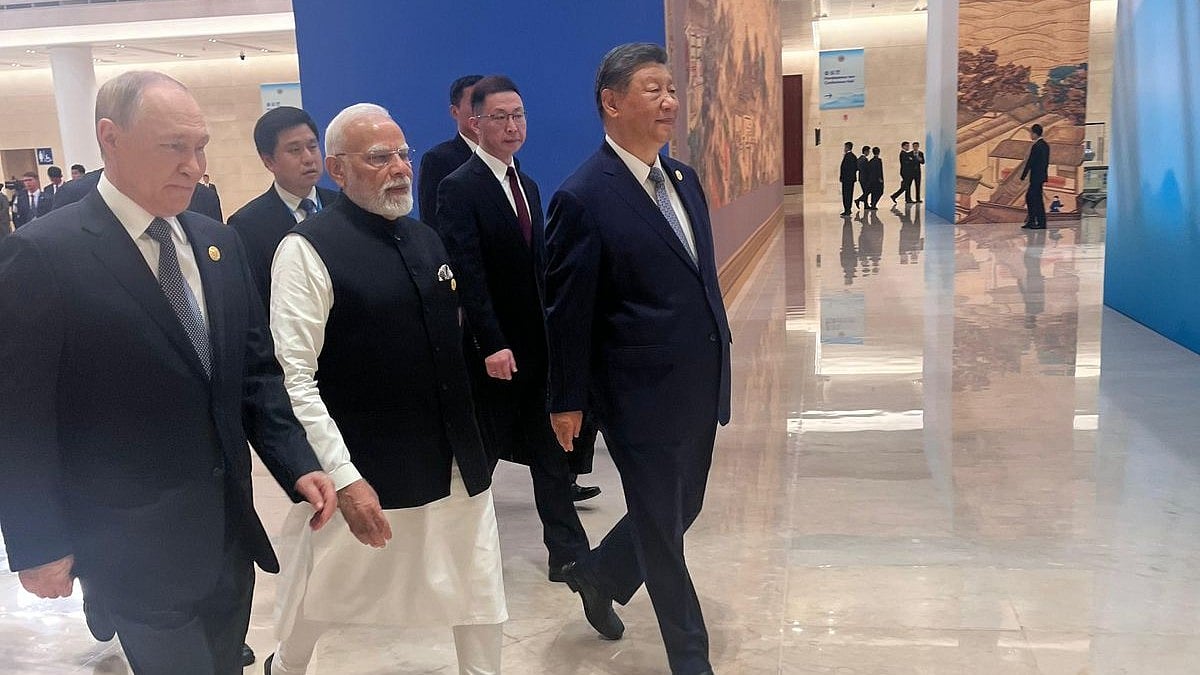World
India, the ‘jilted lover’, at SCO summit in Tianjin
Despite ‘body language experts’ highlighting the bonhomie between PM Modi, Xi and Putin, the takeaways for India are few; it did not even get SCO to name any country for cross-border terrorism

What are the takeaways for India from the SCO summit in Tianjin? With the help of ‘body language experts’ Indian media sought to highlight the bonhomie between PM Modi, Xi Jinping and Vladimir Putin; that Modi travelled in Putin’s car came in for special mention and so did the image of the Russian president embracing the Indian prime minister.
The signalling was clearly directed at the US president, who fumed yet again that India was purchasing most of its oil and military hardware from Russia.
The SCO declaration condemned the terror attack at Pahalgam but also the two terror attacks in Pakistan for which Pakistan blames India. While the statement also condemned cross-border terrorism, it did not name any country by name, as India may have liked.
While the statement condemned ‘bullying’ by certain countries, without naming anyone, Chinese commentators made no secret of the statement also hinting at India initiating Operation Sindoor unilaterally and suspending the Indus Water Treaty.
Significantly, the declaration also condemned the US and Israeli attack on Iran and the genocide in Gaza, neither of which has been done yet by India.
Published: undefined
In contrast to the Russian President’s seemingly calculated display of warmth towards the Indian leader, possibly because Russia is looking forward to strengthen its commercial and economic interests with India, the Chinese president looked stiff while greeting Modi.
Their handshake for the photo op also appeared strained with Xi extending his hand but keeping Modi at a distance. If India, frothing till recently about China being the ‘invisible’ third party in the war with Pakistan, raised the issue, it must have been raised behind closed doors and informally.
Not even a month ago Indian policy makers and the media were baying for China as the untrustworthy northern neighbour. The army top brass publicly said that China was the invisible third party in the short war with Pakistan under ‘Operation Sindhoor’.
Commerce minister Piyush Goyal described east Asian countries as China’s B team, signalling the distrust with Beijing.
Prime minister Modi’s visit to Tianjin, his first visit to China in seven years, and India dropping its earlier stand that a ‘pre-requisite’ for talks with China was restoration of the status-quo-ante in eastern Ladakh to the pre-April, 2020 position — may have been driven by geo-political compulsion.
However, it signalled India’s acceptance of the Chinese occupation of Indian territory in eastern Ladakh.
Even as the Chinese president emphasised that India and China were civilisational countries and ‘partners’, not rivals, uncomfortable questions remained. As strategic affairs expert Bramha Chellaney underscored, Modi’s overtures to China began in 2014 itself and Xi Jinping was the first foreign head of government he hosted after being sworn in as prime minister.
Published: undefined
Modi’s gesture was reciprocated by Chinese incursion into Chumar and Doklam in 2017. Renewed overtures during 2018 ending with the Wuhan and Mahabalipuram summits ended with Galwan. Yet another attempt by Modi now, he felt, to woo China made no sense.
During this same period, however, India refused to join China’s Belt and Road initiative, SAFTA and the RCEP. It also opposed a new BRICS currency, supported by China, Russia and Brazil, to take on the US Dollar. At Tianjin China has again pressed for a SCO Development Bank and it remains to be seen how India responds to it and withstands US pressure.
At Tianjin, Xi went on to outline the “historic achievements” the SCO has made over the past 24 years, in which it has become the world’s biggest regional organisation, accounting for nearly half the globe’s population and about a quarter of its GDP. He said he hoped the SCO could become a major platform to advance multilateralism, collective security and protection from unilateral bullying.
The SCO – a largely security-focused bloc – comprises 10 members: Belarus, China, India, Iran, Kazakhstan, Kyrgyzstan, Pakistan, Russia, Tajikistan and Uzbekistan.
While diplomacy is said to be the art of managing complicated relationships, how complicated the relationships can be between countries was summed up by a NYT report this week, which said, "India is a relatively small fry to both the US and China... If this were a love triangle, India would be the jilted lover.
Trump has, with the 50 per cent tariffs and his advisers’ hostile remarks, dumped it. That casts a shadow over Modi’s new approach to Xi." In short, rebuffed by the Trump administration, India on the rebound reached out to China and has sought to make amends for ruffled feathers.
Published: undefined
Follow us on: Facebook, Twitter, Google News, Instagram
Join our official telegram channel (@nationalherald) and stay updated with the latest headlines
Published: undefined